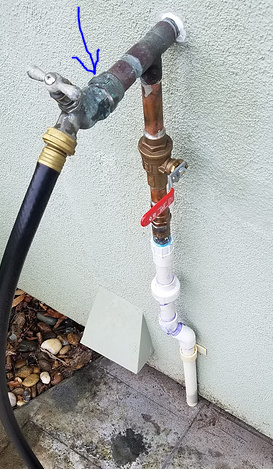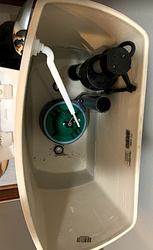I only recommend whale blubber for your sill cock.
yeah. just shut the water off at the main valve or water meter, and disassemble/ reassemble the section that is in disrepair/ leaking
Do any of you home improvement nutters have experience with hardware from a company called primeline?
Was just curious if their stuff is any good.
Aren’t they some manufacturer of generic products like screen frames and springs or whatever? What are you buying?
That they are. They got plenty of products on amazon as well. They do both manufacturing and distribution.
Nothing, just curious because I have some family that works there and they’ve been asking me to do some online work for them. So I was wondering what people thought of their products.
Plumbing question here.
At my girlfriend’s house, when you’re running water at one of the faucets, if someone else uses water (toilet, another faucet, whatever), the volume at the first faucet drops dramatically. It’s especially noticeable if you do a few at once, like say during a bio break during a movie, where we’re both in separate bathrooms flushing toilets and washing our hands at the same time.
I haven’t systematically investigated the problem, but it seems to happen regardless of what combo of “devices” are in use and it doesn’t seem to matter if it’s hot water or cold. She does have a gas-powered “on-demand” water heater for what that’s worth.
Her house is one of those “remodels” where almost the whole of the previous house was demolished prior to the rebuild. So I think (emphasis on think) that most if not all of the plumbing in the house should be new. But, the builder almost certainly did not replace the main water supply line from the meter to the house. I speculate that the supply pipe is galvanized steel, and has corroded up to the point where water flow is restricted enough for us to observe the symptoms described above.
Does that sound plausible? If it’s not that, what are other potential causes? I’ve done a little googling, and a lot of the questions/answers seem to involve specific faucets/toilets/showers having trouble, where in this situation it involves the whole system.
A couple misc data points: the house was originally built in 1964, and the remodel happened in 2011. The main supply line runs about 70 feet from the meter to the house. I have not looked to see if she has a pressure regulator on the supply.
Anyway, I know the answer will ultimately be “get a plumber” but if possible I’d like to be prepared for likely outcomes. Any ideas/thoughts would be much appreciated.
It seems like basic commodity stuff to me, not something I’d expect to have a strong opinion about one way or the other. Pretty sure I’ve bought some of their products before and they did whatever they were supposed to.
@SensiblePerson Check the main valve and make sure it’s all the way open. It could also just be a part of town with low water pressure.
you guys are in the bay area? you do not ever get freezing temps, or?
from your earlier post I gathered that you weren’t in the habit of winterizing that line
It’s possible for temps to drop the tiniest bit below freezing for a few hours or something every few years, but nothing needs to be winterized in California anywhere near sea level.
I don’t even remember that being a thing in Oregon (near Portland).
the composition of the underground stretch of piping can, with almost complete certainty, be determined via visual inspection of the pipe that travels through the basement wall(if there’s a basement). If you have a crawlspace, get down in there and see what the pipe is. You actually may be able to determine it by looking into the meter pit as well. If it’s copper, that isn’t the cause of the problem of inadequate pressure when 2 or more fixtures are in use. They may not have sized the piping properly once within the house, so that can cause a volume issue when there’s greater demand.
The main lines throughout the home should be 3/4" diameter, reducing in size to 1/2" piping only when appropriate. If they skimped and ran 1/2" piping where they shouldn’t have, resizing to 3/4" where necessary is the remedy.
Also, an old galvanized line can cause a serious reduction in pressure, like you say. Moreover, a malfunctioning pressure reducer can restrict flow. It’s reasonable to think that when a device designed to reduce pressure fails, that the pressure would be uninhibited, but there’s a component that inflates os. A diaphragm os lol
I probably would have put in a valve at the arrow as well.

? There’'s a valve in inch in front of your arrow.
Those kind suck though, or at least in my experience they leak and fail a lot.
This is going to be a sick brag that actually reveals that I’m an enormous doofus. I have two accomplishments that I’m legitimately proud of:
- I recently busted the toilet in the master bathroom trying to install a bidet attachment. (I screwed up the piece that connects the cold water inflow to the tank, which I’ve come to learn is the fill valve.) In pre-quarantine times, this would be an auto-plumber deal, as I am both non-handy and a giant chicken when it comes to dealing with anything water related. But, as we all know, things are different now. I hemmed and hawed for a couple of days, but my wife having to go downstairs to pee in the middle of the night was starting to cause marital rift. So I bought a replacement fill valve and successfully replaced it. With hindsight, this was not difficult, but I feel like I’ve leveled up.
Old version:
Old fill valve removed, with no spilled water:
- Hung 3 different paintings(?)/pieces of art(?) weird-ass square items on the wall. The challenge here was getting the spacing right and making sure everything was level. Not terribly challenging, but this laser level made things super easy. Highly recommend:
https://www.amazon.com/gp/product/B07RPW69HF/
Again, these tasks are probably so trivial to most homeowners that it’s silly for me to post about them. Don’t care, still feel like a hero.
You are the definition of a hero!
Advice sought - tagging any contractors @zikzak and @Rivaldo (Might be more, but I don’t know)
These two situations are pretty easy actually, but I want confirmation especially #2 because I told the customer I’d think about it.
#1 Home owner is weird and not available and I think they’re probably a jerk, but haven’t met them. Here’s an example…We set up an appt for me to look at their home this morning. No one is there. I guess they just bought it. Texting:
Me: Do you have the combination for the gate?
Them: yes
Them: go ahead and give me the estimate
No combination given. This is like the 4th lame text communication and they seem like a jerk, right?
My choices are:
A: No soup for you
B: 30% extra on the estimate
#2: Very nice homeowner has had work done. It’s not really in my wheelhouse (wiring a kitchen - I almost exclusively do solar and service changes), but it’s pretty simple. She’s pulled the permit as a homeowner and just hired people directly to do the work. Inspector wants a licensed electrical contractor to do something like be there for the final inspection or somehow sign off on the job. This sounds dumb. The inspector sounds dumb. I think the homeowner sorta let herself be lead to agree to this and feels like she needs to have it done now. I have no idea how much she wants to pay me to check the work out.
I have a hard time not trying to help people, at least if I like them. I definitely should say no, right? I pretty much said no, but said I’d think about it.
#1 I’d say 30% is an absolute bare minimum. Bid the job so high that you still feel good about doing it even if they turn out to be horrible customers. And if they don’t like that price, too bad.
#2 Are you expected to take on liability for the job under your license? That’s not something I’d do as a favor or on the cheap. But I might do it if it was easy for me to verify everything was done correctly and the money was good.
Not a contractor but was self-employed many moons ago.
#1 Add the jerk tax and if he accepts it be very specific about payments, scope, expectations, etc.
#2 Work is work. If she’s going to pay someone to be there for the inspection, it might as well be you (after confirming it doesn’t put you on the hook for anything).
#1 sounds good - both of you. I’m not going to worry too much as it probably won’t happen either way.
#2 I really don’t know what liability I have. I’m sure I have some, but I do not have a contract. I did not do the work. I will not be on the permit. I thought this was the easy one though and people would say not to do it. I have no idea what to charge. It’s so stupid. The inspector knows I didn’t do or supervise the work. She said the inspector said something about making sure the work was up to code and I said, “huh, that’s his job”.
I know I don’t want to say no because it doesn’t seem like a lot to ask and it seems like it might be hard for the HO to find someone, but I don’t really want to do it and I don’t want to charge enough money to be worth it.
These jobs are also both within like 7 blocks from my house. #2 is 1 block away. Not people I knew.
I’m really going back and forth on #2.
#1 It would be job dependent. If it’s an easy in and out type job I usually put up with more from owner. I had recently decided I wasn’t going to work for people that were wasting my time/jerks. Charging them more still wasn’t with it. I was also really busy so was easier to say “no soup for you.”
#2 Electrical permits I think can be like that depending on city/county. Cali is a lot stricter on some on that stuff if I remember correctly. Im in Oregon and most of my work is in Portland. Here the homeowner can act as a general contractor and perform electrical work if it’s their home. If it’s a rental or they are going to sell within 6months they can’t. Just make sure your insurance covers that type of work since you said you typically don’t do it.

